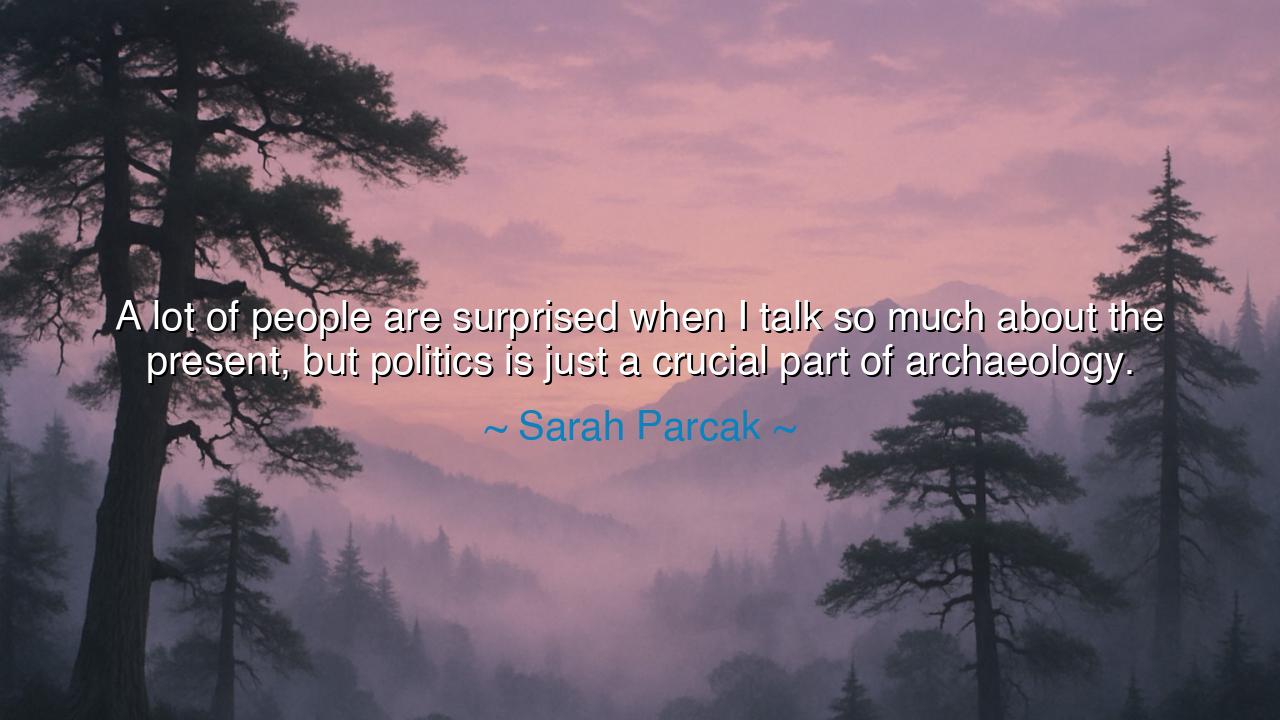
A lot of people are surprised when I talk so much about the
A lot of people are surprised when I talk so much about the present, but politics is just a crucial part of archaeology.






"A lot of people are surprised when I talk so much about the present, but politics is just a crucial part of archaeology." Thus spoke Sarah Parcak, the modern explorer of lost worlds, who sees with clarity what many forget: that the past is not sealed in stone, but lives within the struggles and choices of our age. Her words remind us that to study ruins and relics is not to escape the present, but to understand how human power, ambition, and conflict have shaped both then and now.
The ancients themselves understood this binding of ages. Thucydides, the historian of the Peloponnesian War, wrote not only of battles and treaties but of the eternal lessons of politics, for he knew that the fall of Athens was not the result of chance but of human decisions. So too did Herodotus weave into his accounts the choices of kings and councils, showing that the thread of archaeology is spun from the loom of politics.
Consider the ruins of Rome. Temples, amphitheaters, and aqueducts still stand, but beneath their beauty lies the story of empire, conquest, and decline. To uncover the stones is to uncover the decisions of senators, emperors, and generals. Without knowing the politics of Rome, its archaeology is mute; but once politics is understood, each marble column speaks of ambition, hubris, and the fate of nations.
History also gives us the tale of Troy. For centuries it was sung of by poets as myth, until Heinrich Schliemann unearthed its walls. Yet the tale of Troy is more than gold and rubble; it is the reflection of politics—alliances forged and broken, power struggles cloaked in honor. The archaeology alone gives us ruins; but paired with politics, it reveals the passions of men and the birth of legends.
Therefore, let us learn from Parcak’s wisdom: to separate the present from the past is folly, for both are bound together by the same currents of human striving. Archaeology is not only the science of dust and shards; it is the study of choices, of rule and rebellion, of the eternal dance of politics. To see clearly, we must read the stones with one eye on the past and one eye on the world we live in today, for the destinies of both are one.






MDMy Duong
I love how this quote brings politics into a conversation about archaeology. It challenges the typical notion that archaeology is purely about past events. It makes me think about how archaeology and history can be shaped by the present political environment. Do you think political agendas today influence which archaeological sites get funded or prioritized for excavation? How much do modern politics dictate what we decide to preserve for future generations?
TTDo Tien Thanh
It’s an interesting perspective, especially because archaeology is often seen as a study of the distant past. I wonder if there’s a risk of modern political bias influencing the interpretation of archaeological findings. For instance, could contemporary politics affect how we view certain historical events or figures? Is there a way to ensure that archaeology remains objective and true to the evidence, despite political pressures or biases?
ABabc bb
I never considered how politics could be so crucial in archaeology. Most people think of archaeology as studying the past, not the present. But I can see how the political environment of a time shapes what gets preserved or forgotten. Is there a danger in focusing too much on the present when studying ancient cultures? Could we be missing important historical perspectives because we’re too caught up in today’s political climate?
BTNguyen Tran Bao Tran
This quote really made me think about how interconnected everything is, even fields like archaeology and politics. It’s not something most people would immediately associate with each other, but Sarah Parcak’s point is valid. Politics shapes societies, their decisions, and their cultures, which then leave marks for archaeologists to discover. How much do you think contemporary politics influences the way we view ancient civilizations? Can we truly separate them, or are they inherently linked?